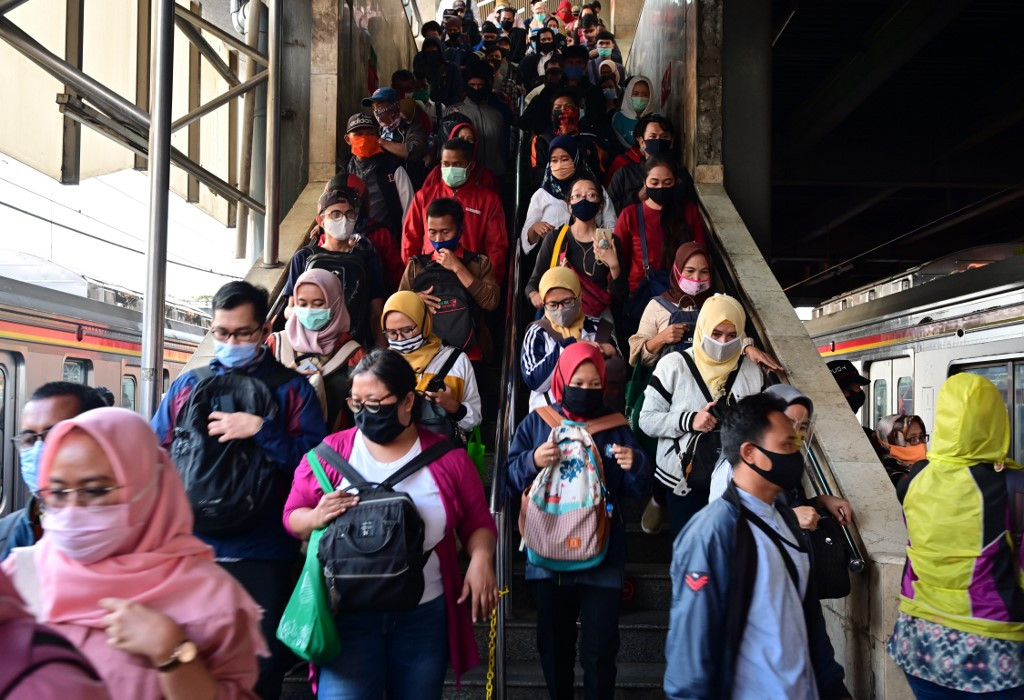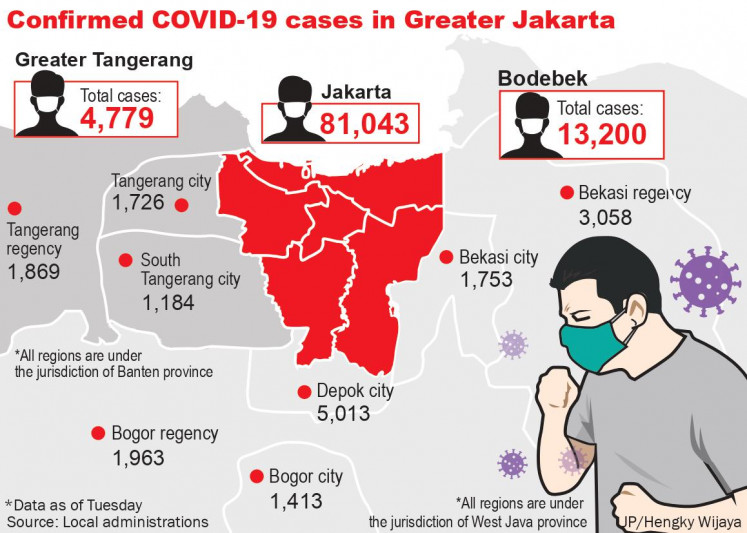Popular Reads
Top Results
Can't find what you're looking for?
View all search resultsPopular Reads
Top Results
Can't find what you're looking for?
View all search resultsExperts urge Greater Jakarta to improve testing, tracing
Change text size
Gift Premium Articles
to Anyone
T
he unabated COVID-19 transmission in Greater Jakarta has forced authorities to expand restrictions, but experts doubt its efficacy as efforts are not implemented equally in each part of the region.
Greater Jakarta includes Indonesia’s capital, Greater Tangerang in Banten -- consisting of Tangerang regency, South Tangerang and Tangerang municipalities -- and “Bodebek” in West Java -- consisting of Bogor municipality and Bogor regency, Depok, as well as Bekasi municipality and Bekasi regency. It is the country’s largest agglomeration area inhabited by nearly 35 million people, many of whom, under normal circumstances, commute for work or study to Jakarta.
But given that people’s mobility remains high even during the pandemic, experts, since the very beginning, have suggested that every local administration in Greater Jakarta implement universal restrictions to prevent virus transmission from following “ping-pong ball" patterns. This refers to resurgence in COVID-19 infections due to people’s high mobility in Greater Jakarta.
The World Health Organization's latest situation report on Indonesia showed that none of the six provinces in Java -- not even Jakarta -- had shown a significant decline in COVID-19 cases in the past three weeks. It reported that West Java had, in fact, seen a “steep increase [in the number of cases] during the week of Sep. 21 to 27.”
By Tuesday, Bodebek and Greater Tangerang have reported 13,200 and 4,779 total cases, respectively. Jakarta, meanwhile, reported a cumulative total of 81,043 cases.
Jakarta is back under the large-scale social restrictions (PSBB), but the curbs are more relaxed than when they were first implemented in April. Workplaces in 11 essential sectors are now allowed to reopen with 50 percent of employees to work in the office at the same time, while offices outside the sectors are allowed to operate at 25 percent capacity.
Read also: Jakarta back under PSBB, but less strict than before
West Java relaxed restrictions, but Governor Ridwan Kamil recently issued a decree for Bodebek to impose curfews and ban dine-in in high-risk COVID-19 red zones.
Ridwan, who spends most of his working hours in West Java’s capital of Bandung, has opened an additional office in Depok to bring him closer to the province's COVID-19 hotspots and to set an example for Bodebek authorities..
Depok alone contributes the most to the cases in five of Greater Jakarta’s cities under West Java jurisdiction.
Ridwan worked from Depok on Friday and Tuesday to monitor health facilities and hold meetings, among other things.
Epidemiologist Iwan Ariawan from the University of Indonesia urged all local administrations in Greater Jakarta to apply identical COVID-19 responses, saying that the existing isolated, unparalleled measures by each administration were ineffective at containing virus transmission.
“This [ineffectiveness] likely is caused by restrictions that are not as strict as before, and because measures to curb COVID-19 were not performed equally,” Iwan said on Monday.
Read also: Not enough for Jakarta alone to reimpose COVID-19 restrictions: Epidemiologists
Without stricter universal mobility restrictions, Greater Jakarta must at least improve testing, tracing and isolation of patients.
Epidemiologist Dicky Budiman of Australia's Griffith University said any containment efforts would be pointless if testing disparities remained between Jakarta and its neighboring cities.
Among three provinces that include areas in Greater Jakarta, only Jakarta has met the WHO testing benchmark of one per 1,000 people per week.
West Java, home to 50 million people, had only tested 183,649 people as of Sept. 27, while the number of people tested in Banten was not available.
“Without proper testing, tracing and isolation, the impacts of PSBB on public health will be very minimal. But, at the same time, the social and economic costs will grow,” Dicky said.
Read also: Use antigen tests for screening but with caution: Experts
Both Dicky and Iwan said contact tracing and isolation of patients, probable cases and their contacts in all Greater Jakarta cities were lacking.
The Health Ministry's latest COVID-19 protocols deem contact tracing capacity adequate when more than 80 percent of new cases' close contacts are identified and quarantined within 72 hours of the cases being confirmed.
Iwan said health authorities in Greater Jakarta should move to tackle delays in performing contact tracing, which resulted from long testing turnaround times. Testing backlogs remain common in Greater Jakarta, with turnaround taking up to three days on average.
“Not all authorities understand the importance of [testing, tracing, isolation]. It is clear that we will be very far from being able to contain the disease in Greater Jakarta if we don't intensify these fundamental strategies in each region first,” Dicky said.











